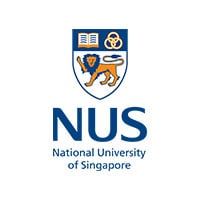Hello there! My name is Maliha Haque, and I am from Dhaka, Bangladesh! I am currently a first-year student at the National University of Singapore, a top-ranked university in the world, and I'm studying computer science. I initially left my home country to pursue medicine in the UK before taking a gap and moving to Singapore—a sudden dream switch that was worth pursuing.

High School Background
I went to Chittagong Grammar School Dhaka, where I studied under the British curriculum till graduation. I’ve had a science background all my life, completing my A-Level examinations with Math, Physics, Chemistry and Biology with all A-star grades. In addition to my high school reports, I also submitted my IELTS score of 8.0 to NUS.
In many ways, I believe that my English-Medium background and curriculum made the process for applying abroad easier. The A-Level certificates, for instance, are awarded to us by the Cambridge Board in the UK and they are, hence, internationally recognized. Moreover, since I’ve always been taught in English, studying abroad has been an easier experience in terms of language and communication barriers, which are common problems faced by international students.
Why I chose Singapore and NUS
My interest in Singapore was piqued during my primary years of school, as all of our textbooks were shipped from there. From their education system to their techniques used to combat littering and traffic issues, the way Singapore was portrayed through those books made the idea of it really appealing to me. Years later, when I was navigating through the next steps of my academic journey, the National University of Singapore rose in its ranking and caught my attention, ultimately rekindling my childhood interest.
The one thing I always strive for in education is for it to be very interactive and two-sided. I prefer a dynamic environment where I can communicate with my professor to probe deeper into the topic I am studying. Alongside being the sixth best in the world for computer science, NUS also offered me that sort of learning experience. Besides, with their outstanding research facilities and competitive academics, NUS has always stood out to me since I was young and researching universities and their application processes. Moreover, I felt like I would not face much of a culture shock if I chose a university within Asia, and I stand to be corrected. Singapore is near to home and the living experience is very similar to Bangladesh in the sense that people aren’t as heavy on partying, for example. Hence, I would say that I settled in more comfortably over here, which probably wouldn’t have been the same for me if I went to Europe or America.
Preparing My Application: Essays and ECA’s
So, I applied to NUS through my own efforts without the help of any external agencies. Elaborating on the application process, I’d say they certainly do place a focus on extracurriculars. I definitely had my own share of activities beyond the classroom to list down. One of my major ECAs includes being the founding president of the charity organization Leo Club of Dhaka Shurovee, which is connected to the global service organization Lions Clubs International. Besides that, being the football captain for my high school and attending the 2019 Harvard MUN in Boston also counted as my noteworthy endeavors.
However, the application process in Singapore is quite different in the sense that they mostly focus on your grades. With an acceptance rate of less than 10%, NUS greatly favors excellent academic records over all else, and filling that criteria should definitely be your first priority. I believe that I and even many of my friends who got in were selected based on our impressive academic standing.
From what I know, you need to write long personal statements and supplemental documents when applying to America or the UK. In contrast to that, Singapore seemed to have a more direct admissions process. When applying to NUS, I was simply asked five short, straightforward questions, mostly centered around my goals in life and what I’ve done to support my passions. I enjoyed writing about what I wished to do with my degree moving forward, as it gave me the chance to explain how I hope to combine my knowledge of computer science with my aim of helping underprivileged people. Overall, there wasn’t any beating around the bush in my opinion, and I feel like I personally preferred that over an elongated process with countless essays.
On a side note, I did not apply for most of the need-based scholarships since it was too far past the deadline by the time I sent my application. Hence, my parents are currently funding my education at NUS.
Why I Didn’t Choose Brunel
The interesting part about my application journey is that I initially considered the UK for medical school. Considering how I have relatives there and the fact that I am accustomed to the British curriculum, I believed that the UK would be a good choice.
Being raised by parents who were both doctors, I carried a similar dream for the better part of my life. A part of me wonders if it was because I wanted to become just like them, but I choose to believe that it stems from the fact that I have always aspired to help people. Hence, I felt like becoming a doctor was the most straightforward way to do that, ultimately leading to me applying for medical school years later and getting in.
However, upon landing in the UK and attending Brunel, I realised that this institution was nothing like what I had dreamed of. Like I said, I always strived to pursue education that was engaging, interactive and everything else that came with it. Brunel was a convenient space, but over there, we were just given videos to study and quizzes to complete. Moreover, external costs in the UK, such as paying for medicine, were very high. I began to feel like I was paying for an education, which I probably could have received elsewhere at a lower rate. More importantly, I began to question whether the field of medicine was for me at all, let alone Brunel. I realised that I was always more interested in subjects like mathematics than biology, and I understood logic and concepts better than the human body.
Ultimately, I withdrew from Brunel and began attending NUS after a gap year, which gave me enough time to reflect on what I truly wanted. After a lot of thinking and discussing, I realized that the major that would align with my interests and future goals was not medicine but computer science. Yes, definitely a hot topic in the realm of go-to majors—and for good reason. What I love most about computer science is that you are not restricted to a single career path. In today’s technically-advanced world, every career out there requires someone experienced with computing, or so I believe. So, say, if I wanted to get into healthcare or work for WHO, I could likely pursue that goal with my degree. Instead of limiting myself to becoming a doctor, I chose to broaden my field and let my love for learning new things thrive. The main point I wanted to highlight here is that it is never too late to do what you want and what you believe will help fulfill your future aspirations. When I quit attending medical school, hearing both surprised and disappointed responses from relatives and friends was mentally overwhelming. I applied to NUS in the middle of that chaos, so the fact that I got accepted to one of the world’s most competitive schools renewed my belief in myself. The wait was a long rollercoaster ride, but it was worth it.
NUS Academics and Campus Life
When I was applying, I remember being excited by all the articles about it mentioning how CS at NUS is one of the most challenging degrees out there. I always relished an academic challenge, so I was looking forward to it. Upon attending NUS, I got humbled really fast.
Academics at NUS are at an entirely new level of competition. What I understood from my Singaporean friends is that they tend to garner a very competitive mindset from a very young age, typically taking their first board exams when they are eight or nine. Hence, the study culture, as you can tell, was definitely intimidating compared to what I experienced during my entire life back home. Over here, everyone heavily prioritizes academics and you will find them studying throughout the weekends as well as during holidays. I initially assumed that the class environment was beginner-friendly and you did not require prior experience—convenient, I thought, since I had never studied CS before. However, even though the course that was supposed to introduce us to coding was so fast-paced, I got caught off-guard, and I felt very behind compared to my classmates who had experience in what they were studying. It took a while to catch up with everything, and it took quite a toll on my mental health. On the other end, however, the support I received to tackle this tough environment was something I never got from Brunel. For instance, you can go and do free one-to-one consultations with faculty every week if you have trouble understanding what you’re studying.
Their campus itself is gigantic and a delightful sight in its own way, with convenience stores inside different parts of the campus and places to go so that you can unwind after a hectic day of studying. The community is also very diverse and welcoming. As a Muslim, one of the things I like the most about NUS is that it is very Muslim-friendly. They have separate options for halal food in every cafeteria and have bathroom stalls that provide bidets. I truly appreciate that they keep these little things in mind.

Beyond the Classroom
NUS has multiple clubs for various endeavors, including all types of sports. I joined the badminton and handball club, where I’ll go once a week to join my teammates and train or play.
I chose a degree that requires a lot of attention put into it, which is why my work-life balance can get quite lopsided. I have friends who study the arts and those who study economics and I see a much smoother work-life balance than mine. I try to improve it by improvising. I study overtime during my weekdays after class so I can keep my weekend schedules comparatively freer. During those times, you will find me stepping out of campus and exploring Singapore with my friends. I believe that it is important to awaken the tourist in you at those times and immerse yourself in the delight of living in a foreign country.
On-campus Jobs and Internship Support
Well, another great thing about NUS is that we have something called tutorials, where students engage in small study groups for one to two hours after lectures to reinforce the topics they learned. Moreover, tutorials are conducted by senior students. Individuals who excel in a module can apply for positions in the following year which offer compensation at a rate of approximately forty dollars per hour.
Beside that, there are also lots of cafes and restaurants which hire students to work and earn money as well. I plan to apply to being a teacher’s assistant in my second year after I make more progress in my studies.
Post-grad Goals
I’m a very big family person, so as long as my parents are in Bangladesh, I am certain I would like to return there.
My choice to switch to CS plays a big role in my post-graduate goals. As I mentioned before, I worked for Leo Club, where I helped arrange and manage food and health camps for the underprivileged, amongst other responsibilities. The inner peace that came from making someone’s day better made me passionate about doing my part in society. With that being said, unlike other countries that withhold and receive international funding for these causes, Bangladesh has too many political barriers and corruption to receive the support they need. I wish to help combat this issue, and studying CS may help me, say, make my own website and reach out to potential investors and donors. During my visits to various old-age homes and orphanages, I noticed that some places required more attention. I aspire to spread awareness about their existence by presenting a proper structure to local or foreign donors to showcase their need for funding and support. I believe I could help attract them by presenting their living conditions through pictures, words, and any other means necessary to give them the attention they require. This is why I think studying CS could empower me to make a difference in this area.

My Advice to Future Applicants
I would say to choose a country and institution that speak true to your character. Go all the way and consider all aspects, like student life and weather, to decide if that is a place you will flourish in, both academically and mentally. Personally, I experience a sort of seasonal affective disorder, so gloomy weather without sunshine tends to negatively impact my mental health. Everyone is distinct in their own way, and there is always a place that will meet these differences.
Also, I feel that it is quite common to feel lost after high school since you don’t get that sort of guidance where you will be spoon-fed at every step anymore. During those times, always remind yourself that it is important to stay on track and up-to-date with the content you wish to pursue during university. If you want to study medicine, for example, try to get some hospital work experience. If you want to study CS, try to familiarize yourself with coding beforehand. Gaining that little experience will definitely help you go a very long way.
Most importantly, I would like to emphasize again that it is not the end of the world if what you initially wanted to pursue does not work out for you. Your 20s, at the end of the day, are mostly about figuring yourself out and gaining new perspectives on what you want out of life every other day. If it feels right and necessary, take the big step and let yourself change. Allow yourself to explore other options instead of limiting yourself to one possibility. University will be a long ride, so focus on the journey, not the destination.






